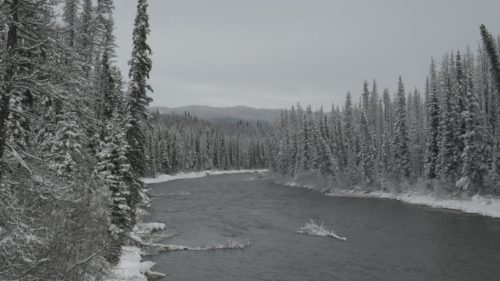With RCMP enforcement of CGL's injunction looming in Wet'suwet'en Yinta, will the B.C. government intervene?
With RCMP enforcement of CGL's injunction looming in Wet'suwet'en Yinta, will the B.C. government intervene?

From one perspective, it's a simple enforcement of a court-granted injunction for a corporation. From another, it's yet another invasion by settlers onto unceded Wet'suwet'en lands, this time to build a fracked gas pipeline without the consent of the hereditary chiefs.
The B.C. government made the United Nations Declaration on the Rights of Indigenous Peoples into provincial law in November 2019, which includes the principle that Indigenous nations must give free, prior, and informed consent (FPIC) before development on their territories can proceed.
On December 31, 2019, B.C. Supreme Court Justice Margeurite Church ruled that, although the Wet'suwet'en hereditary chiefs had not consented to construction of the Coastal GasLink pipeline through their territory and there were unresolved questions from Canada's perspective about title to the land, the RCMP would be authorized to remove and, potentially, criminalize those blocking construction.
The hereditary chiefs, after evicting CGL from their territory on January 4, 2020, demanded in a press release:
- "That the province cease construction of the Coastal Gaslink Pipeline project and suspend permits.
- That the UNDRIP and our right to free, prior and informed consent (FPIC) are respected by the state and RCMP.
- That the RCMP and associated security and policing services be withdrawn from Wet’suwet’en lands, in agreement with the most recent letter provided by the United Nations Committee on the Elimination of Racial Discrimiation’s (CERD) request.
- That the provincial and federal government, RCMP and private industry employed by CGL respect our laws and our governance system, and refrain from using any force to access our lands or remove our people."
They add that, "There is no access to Wet’suwet’en territory without our consent. We are the title holders, and the Province must address the issue of our title if they want to gain access to our lands."
Today, Friday January 10th, the Media Co-op asked the B.C. government if they would intervene and call off the seemingly impending RCMP enforcement of the injunction.
The B.C. Ministry of Energy, Mines and Petroleum Resources responded in a statement that, “Our government respects the right of people to peacefully protest, but we must all respect the decisions of the Courts." While the statement makes reference to Canadian law, it does not mention respecting decisions made through Wet'suwet'en law.
The statement continues, saying that on the issue of RCMP enforcement of the injunction, "those decisions are made by the police, who operate independently of government."
This understanding of police independence is somewhat of an oversimplification, as there is not absolute police independence in Canada, as legal scholars like Kent Roach have pointed out. And for those who remember the history of centuries of colonial policing, including recent history like Ipperwash in 1995, there may be cause for doubting the clear lines of independence between police and government.
"Our hope is that a peaceful resolution can be found that respects the Court’s decision and ensures people are safe," reads the Ministry statement. This is a similar injunction to the one granted in December 2018, which led to heavily armed RCMP being allowed to use "use as much violence toward the gate as you want" to breach a gate with many people just behind it, and "lethal overwatch," meaning deployment of officers ready to use lethal force. Whether this injunction acts to keep people safe is debatable.
That said, the Ministry indicates that "the RCMP has said they are in contact with both the Wet’suwet’en Hereditary Chiefs and the company and want to find a resolution that doesn’t involve police enforcement."
According to a statement sent to The Tyee, the commanding officer of the B.C. RCMP is "actively engaged in facilitating a discussion with all the stakeholders."
The Ministry did not say the B.C. government would meet with the Wet'suweten hereditary chiefs on this issue, as requested by the chiefs. However, the Ministry says, "we remain engaged with the Office of the Wet’suwet’en, in government-to-government discussions that seek to meaningfully advance reconciliation. This work is not related to any specific project.”
When asked in a follow-up whether the province would heed a demand of the chiefs and suspend CGL's permits for the pipeline until the issue of consent and/or title is resolved, the Ministry declined to comment. The permits for the pipeline are provincial, not federal, as it does not cross provincial borders.
Solidarity actions were held across Canada and some in the U.S. on Friday. More are planned over the weekend.


